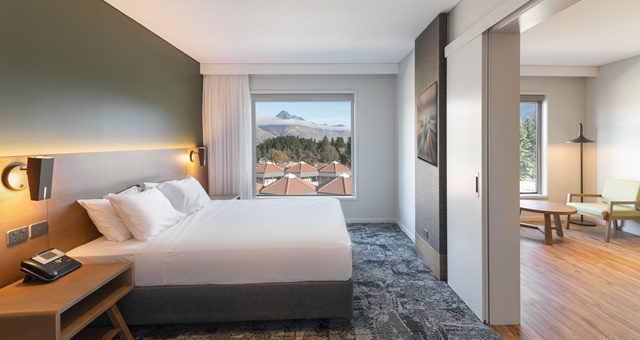
Going green is no longer the ‘in’ thing – it’s a ‘must do’ for the hotel industry, and it can prove to be a lot easier and cost-effective to do so from the first sod-turn, as Matt Lennon discovers in this exclusive chat with Pro-invest Managing Partner, Dr Sabine Schaffer.
Hotels are under no illusions in 2020 about the need for everybody to be doing their part, no matter how small it may be, to slash or even eliminate its environmental emissions. This is particularly pertinent as travellers are often conducting their own investigations into a property’s green credentials before booking a stay – it’s more of a deciding factor than ever.
For older, historic properties, carrying out renovations on ageing or historic edifices can make ‘going green’ a highly expensive exercise, and many out there are doing the best they can in more tangible, everyday ways such as improving recycling, reducing or incentivising guests to reduce housekeeping needs and using green materials in what renovation work they do. At the other end of the scale, some companies have implemented at an institutional level a culture of sustainability, building clean and green from the design stage through to doors opening to guests and beyond on a
daily management basis.

Pro-invest Group, the Australasian Master Franchisor for IHG’s Holiday Inn Express brand, has been building momentum in recent years, growing the brand in capital cities and regional centres around the country. These include Brisbane, Sydney (Macquarie Park), Newcastle, Adelaide, New Zealand and most recently in Melbourne’s Southbank, with more coming to Parramatta, the Sunshine Coast and a second in Melbourne and Sydney. Canberra and Wollongong are also on the drawing board but are yet to be announced.
Late last year, the investment and development firm announced it had secured AUD$50 million from the Clean Energy Finance Corporation (CEFC) – an entity which invests in commercial and residential developments incorporating renewables in the majority of its operations. The CEFC mandates adherence to the National Australian Built Environment Rating System (NABERS), with buildings rated on energy and water efficiency, waste management, emissions and a number of other criteria. This funding was incorporated into Pro-invest’s Australian Hospitality Opportunity Fund II, which will see it aim for all future Holiday Inn Express hotels developments to obtain a five-star NABERS rating.

Pro-invest Managing Partner, Dr Sabine Schaffer, said if a hotel owner wanted to make a significant positive impact on the environment, it starts at the design stage and having a clear handle on the water and energy consumption of your assets.
“By putting in effective systems that allow you to recycle and to reuse that energy, you can save on a lot of energy costs and do the right thing by the environment,” Dr Schaffer said.
“What we did with Melbourne Southbank was we cooperated with CEFC (Clean Energy Finance Corporation) in the form whereby CEFC came on board as a debt provider together with CBA (Commonwealth Bank of Australia), one of the banks that we are working with closely, and provided us with a slightly cheaper loan facility that would effectively offset any of the additional costs we had to accrue in order to put all of these design efforts into the physical building.”
The list of criteria required by Pro-invest in order not just to meet the CEFC standards but its own includes low-carbon construction techniques including cross laminated timber, energy efficient building management systems as well as heating and cooling equipment. Beyond that, hotels will carry high-performance glazing on windows, air-cooled chillers and condensing boilers, rooftop solar and regenerative lift drives, which store the energy generated from regular operations and return it to the hotel’s grid to use in other areas.
Catch the complete interview with Dr Schaffer in HM Magazine’s June 2020 edition, which will be released digitally next week. CLICK HERE to subscribe.

